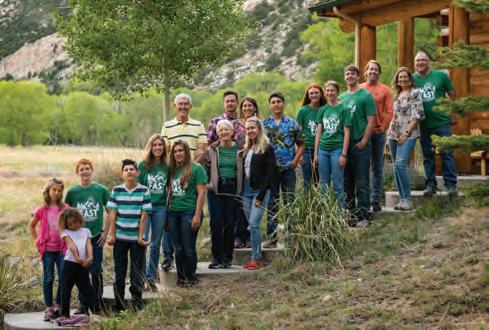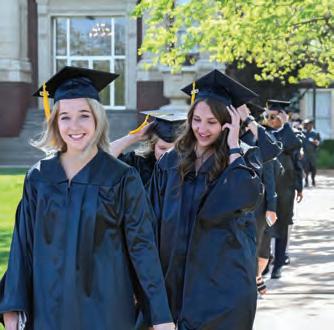











Life is full of insight to be discovered through curiosity and lifelong learning.













Life is full of insight to be discovered through curiosity and lifelong learning.
Jesus remains constant in seasons of change
Theancient Greek philosopher Heraclitus is credited with saying, “Change is the only constant.”
Isn’t that the truth? Change is all around us. Seasons change as summer heat gives way to crisp fall air, leaves crunching beneath our feet. We change as we grow, trading the innocence of youth for the wisdom—and gray hairs—of adulthood. We begin new jobs or retire from long-held ones. And, as the calendar inches toward fall, we (or someone we love) may face the change that a new school year brings.
Maybe you’re the mom anxiously sending her firstborn to kindergarten, or the dad watching his middle schooler begin high school, or the grandparent celebrating as a high school graduate heads to freshman orientation or the workforce. Maybe you’re a student or a teacher anticipating a new classroom of learners.
I’m the daughter of two educators, and for many years, our lives revolved around the school calendar. Maybe you, like me, remember those first-day-of-elementaryschool nerves mixed with excitement, wondering what your new teacher would be like, whether you’d make friends in your class and who got braces over the summer. Each level of education brings change with the anticipation of new subject matter, classmates and teachers.
As many of us turn our thoughts toward school, the feature department in this issue focuses on education.
• David Faber writes about loving God with our minds.
• David Janzen and André Stephens discuss challenges facing Christian colleges and hope for the future.
• Kelsey Ensz suggests ways to support teachers and students through prayer.
• David and Joanne Loewen and their daughter, Tena Roehrich, offer four considerations for choosing your child’s education.
• Shirley Holm shares about a literacy mentoring program at an elementary school.
A child’s education is important. Because of our teachers, we can read and write and speak in complete sentences and debate important topics like the necessity of the Oxford comma. We are all indebted to the classroom servants who chose to spend their days chasing first graders or braving a room of high energy middle schoolers, powered by coffee and a belief that teachers make a difference.
But education is equally important for those of us who have left school behind. Life is full of insight to be discovered through curiosity and lifelong learning.
As Christians on the journey to sanctification, we have a Teacher who never changes. Jesus is the same yesterday, today and forever (Hebrews 13:8). He is our perfect example. By following our Savior, we are transformed by the renewing of our minds (Romans 12:2) and grow to be more like him.
As we navigate life’s changes, whether to school, new jobs or new stages of life, let’s walk with Jesus, the author of our faith and the One who never changes. Janae Rempel Shafer
Publisher: United States Conference of Mennonite Brethren Churches/ISSN 0009-5149
Editorial Committee: Matt Ehresman, Michele Fiester, Aaron Garza, Ryan Loewen, Shelly Spencer, Tony Petersen.
Review Committee: Aaron Box, Jordan Ringhofer, Brent Warkentin, Daniel Rodriguez
Disclaimer: The content and viewpoints expressed do not necessarily reflect the views, beliefs and/or viewpoints of USMB as a whole.
Copyright: Articles are owned by the Christian Leader or the author and may not be reprinted without permission. Unless noted, Scripture quotations are from the New International Version.
Subscriptions: $10 for six issues and $20 for 12 issues ($15, $30 in Canada, all other countries $25 for six issues); $2 per copy.
Correspondence: Christian Leader, Box 155, 107 N. Main, Hillsboro, KS 67063-0155. Phone: 620.947.5543. Email: editor@usmb.org
Membership: Evangelical Press Association and Meetinghouse
Postmaster: Send address changes to Christian Leader, Box 155, Hillsboro, KS 67063. Periodical postage paid at Hillsboro, KS
Interim Editor
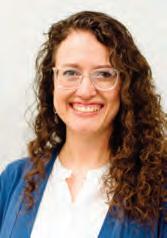
■ Janae Rempel Shafer, INTERIM EDITOR
■ Shelley Kallsen, GRAPHIC DESIGNER




Mireles Lexi Milne Aaron Snowder
Edmond, Okla.



As
Educationis central to our relationship with God. In fact, the more we pay attention, education is front and center throughout the Bible.
In Deuteronomy 5, Moses begins to educate the people of Israel about God’s laws and commands. In chapter six, he instructs parents, to ensure they teach these things to their children. Even more, throughout Deuteronomy in particular, learning God’s commands is directly tied to one’s ability to love God. Education is required to live a life of responsive love toward God.
Going and making disciples can also be described as a type of educating. Disciplemaking is teaching others how to walk in obedience to Jesus.
In Matthew 9, Jesus tells the religious leaders, who seem to think they have learned all they need to know, to discover what it means that God desires mercy, not sacrifice. Education does not end with degrees or titles. Proverbs 1 tells us the wise continue to add to their learning.
Jesus goes on in Matthew 11 to give a beautiful invitation to find rest. The way to this rest is to be educated by Jesus, to take his yoke and to learn from him. The right education can bring life to our souls.
The very nature of our relationship with Jesus is that of disciples. The word “disciple” comes from the Greek word “mathetes,” meaning student or pupil. You could say we are called to lifelong education, learning to live the way Jesus would live.
Going and making disciples can also be described as a type of educating. Disciplemaking is teaching others how to walk in obedience to Jesus.
Our ability to obey God, to follow Jesus and to tell others about God all require a form of education. We are all called to be students as well as teachers. We are all invited into God’s education process.
If education is in fact central to our walk with God and to the great commission, it follows that our educational institutions are of incredible importance.
I have had the pleasure of spending time at Tabor College and Fresno Pacific University this past year. On both campuses I have met students who have come to faith while at our colleges as well as students who have been encouraged in discovering God’s call on their lives. Each time I visit one of our schools, I am reminded how much they need our prayers and partnership with our churches because they serve a critical role in God’s educational process.
Do you see yourself as a student? As a teacher? As followers of Jesus, we are all called to be both. What step could you take this week to more intentionally walk as a disciple of Jesus and to disciple others in Jesus? Education is central to our calling as Jesus followers.
Further, what would it look like for us as a family of churches to broaden our investment in Jesus-centered higher education. Not just dollars, but in prayer and in partnership?
Education is central to our relationship with God. So, let’s ensure it is a priority in our lives and in our churches.
Aaron Box aaron@usmb.org

500 years of Anabaptism
Whowere the early Anabaptists? Were they schwärmer, a German word meaning “enthusiasts” or “extremists,” calling to mind a swarm of irritating insects? Were they sainted men and women willing to follow Christ even to the death—even for the sake of their enemies?
Many early Anabaptists really were radical, even in ways that today we would reject. And many early Anabaptists did live exemplary lives, even giving those lives for the sake of the gospel and their pursuers. However, most Anabaptists were simply normal Christians who were trying to follow Christ as best as they could. Most were people like Katharina Purst Hutter.
In 1532, Katharina Purst was a maid to Paul and Justina Gall, who were part of the Anabaptist community in Tyrol in modern-day western Austria and northern Italy. The Galls hosted Anabaptist leaders and meetings, and Purst joined Justina in bringing much-needed food to people hiding in the forests from the authorities—an act that put the women at risk as well.
Jakob Hutter, an early Anabaptist convert, was the leader of the Anabaptist community in this region. He was a charismatic leader who formed Anabaptist congregations and baptized new believers. When Purst made her confession of faith in 1532, it was Hutter who baptized her.
Unfortunately, Anabaptist hunters found out about these meetings and arrested the Galls and Purst in 1533. After torture—a government source advised that “they should be beaten on the appropriate parts of their bodies”—Purst recanted and was forced to deny her Anabaptist beliefs for three consecutive Sundays in the local Roman Catholic church.
In this, Purst was much like other Anabaptists of the time. While many freely gave their lives for the sake of the gospel, others, when faced with death, chose to do what they could to stay alive. As historian Brad Gregory writes, “Anabaptist men and women were devout human beings, not automatons marching en masse to their death.”
Purst fled to Moravia in central Europe, where she soon married Hutter. Despite the risk to their lives, they continued to minister to people, traveling from town to town preaching the gospel message and making converts to Anabaptist beliefs. However, just months after their marriage—and while she was pregnant—they were captured. Jakob Hutter was
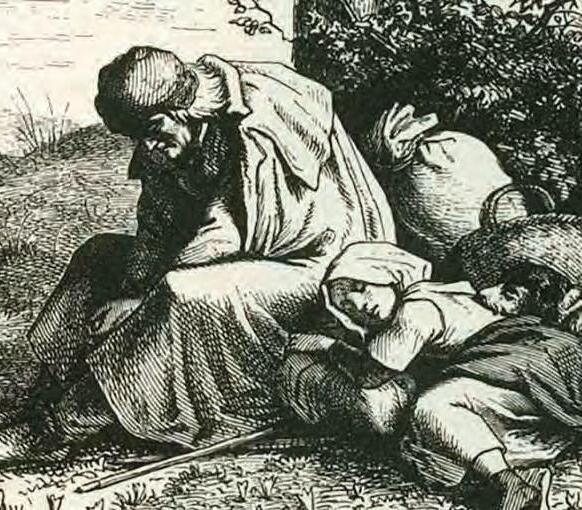
subjected to torture and was burned at the stake in February 1536.
Katharina Hutter, perhaps because of her pregnancy, was spared such harsh treatment, and the Roman Catholic authorities held out hope that she could be convinced to recant once again. This time, however, was different. The church building, she said, was nothing but a “pile of stones”—the true church was the people of God following him in community. Infant baptism, she boldly proclaimed, was nothing more than “a bath in dirty water.” As another government source put it, “The wife of Jakob Hutter … persists in her stubborn opinion.”
She eventually escaped, perhaps with the aid of one of her guards, and lived in freedom for two years. In 1538, she was arrested again, and this time, she was executed immediately.
Hutter was most likely just over 30 when she died and enjoyed only a year of marriage. Much of her time was spent on the run. She was unable to raise a family. Her life was full of danger and insecurity. And yet, she put her life at risk so that many others might know the gospel. Though she recanted, given another grim opportunity to do so, she held firm to her beliefs. She persisted in her stubborn opinion in following Christ, even to death.
Tony Petersen is a historian and the pastor of Mountain View Clovis, Clovis, Calif.
Compiled by Janae Rempel Shafer

The USMB Leadership Board held its annual spring meeting March 28-29 in San Diego, Calif. The board acted on several agenda items, heard ministry reports and discussed activities and ministries related to the three USMB core commitments: disciplemaking, leadership development and church multiplication.
Action items from the Friday sessions that included the Leadership Council included affirming the formation of networks of churches to plant new churches and closing the Church Planting Council (CPC), with designated CPC funds set aside for future church planting projects and redirecting budgeted funds to USMB NextGen.
The Leadership Board reviewed revisions to the Governance Manual and changes to a recommended revision to the USMB bylaws related to reversion of church property.
Treasurer Gaven Banik and USMB bookkeeper J.L. Martin presented a financial report.
Martin, who is also the USMB event planner, reported that Gathering 2026 will be held in Salt Lake City, Utah, July 21-25, 2026.
The board discussed avenues for supporting immigrant churches and plans to develop a unified licensing procedure that all district conferences would follow and heard an update on Tabor College’s plans to offer graduate theological studies.
The Leadership Board heard reports from Aaron Box, USMB national director, and Council members Jesse Swiers, BFL chair; Kyle Goings, USMB NextGen director; Jon Wiebe, MB Foundation president and CEO; Bruce Enns, Multiply general director; and district ministers Jordan Ringhofer (Pacific) and Daniel Rodriguez (Central). The National Strategy Team also reported.
When the Leadership Board reconvened Saturday morning without Leadership Council members, it affirmed the direction proposed by the Multiply Task Force and reaffirmed Yvette Ngale as the USMB representative on the Mennonite Central Committee U.S. board. The board received updates on memorandums of understanding for church planting, the Christian Leader Editorial Committee, the National Strategy Team and CORD, the USMB ministry with immigrant churches.—CL
The Christian Leader received three awards in the Evangelical Press Association 2025 contest, including an Award of Merit in the Awards of Excellence contest and two awards in the Higher Goals contest.

Awards of Excellence recognize publications as a whole. The Christian Leader received an Award of Merit in the denominational print category. The judge specifically noted the Church Spotlight column for the way it showcases specific congregations and commended the design.
There were 868 entries in the Higher Goals competition that honors individual aspects of a publication, such as writing, photography, design and special features.
Jim Holm received fourth place in the Higher Goals: Biblical Exposition category for his article, “Made in the image of God,” an essay published in the Sept/Oct 2024 issue that explores Mark 12.
Associate editor Janae Rempel Shafer received a fifth-place award in the Higher Goals: Reporting category for her article, “Serving in solidarity,” published in the Jan/Feb 2024 issue. The article tells the story of Pastor Lawum Kayamba and his ministry among immigrants in Portland, Maine.
The awards were presented at the Evangelical Press Association Christian media convention, held May 46 in Branson, Mo.—CL
A record number of participants from four of five USMB districts met in San Diego, Calif., for USMB’s National Pastors’ Orientation, March 24-26.
Thirty-six pastors and spouses registered for the event, with 27 U.S. Board of Faith and Life members, district ministers, agency representatives and USMB staff members adding to an overall attendance of 63. That number ties the record set at the first-ever NPO in 2005.
The three-day event, hosted by the BFL, featured eight sessions led by BFL members, USMB National Director Aaron Box, district ministers and others. Micah Bentley, Axiom Church, Peoria, Ariz., led times of worship through singing. During Tuesday afternoon’s free time, most atten-

dees opted to participate in a group whale-watching activity sponsored by MB Foundation.
The NPO is held every two years on odd-numbered years, and all recently licensed pastors are strongly encouraged to attend. The next NPO will take place April 12-14, 2027, in San Diego.—USMB
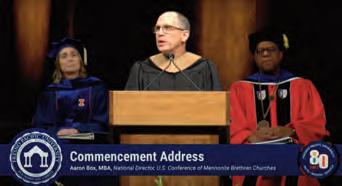
ceremonies May 10.
More than 800 new Fresno Pacific University graduates were recognized during commencement
In all, 863 students were eligible to graduate: 183 from traditional undergraduate programs, 284 from bachelor’s degree completion programs and 396 from graduate programs, including 23 from the seminary.
Aaron Box, USMB national director, served as keynote speaker at both the morning undergraduate and the afternoon graduate ceremonies in Selland Arena in downtown Fresno. Box advised students to pursue their calling—not their dreams.
In the morning ceremony, FPU bestowed an honorary Doctor of Humane Letters upon Edmund Janzen. As a professor, mentor and administrator, Janzen shaped generations of students, guided faculty with wisdom and strengthened the mission of Christian higher education. Janzen served as the fifth president of Fresno Pacific from 1975 to 1985.—FPU
Tabor College, Hillsboro, Kan., celebrated its 115th Commencement May 3 with two ceremonies. The 140 undergraduate students and 42 graduate and online students represented 30 states and 16 countries. Fortynine undergraduates earned academic honors.
Cathy Beachy, director of the Copper Hills Center for the Arts in Peoria, Ariz., spoke at the undergraduate morning ceremony. Beachy challenged the graduates to “create to create” and to live authentic lives.
Melinda Rangel, Marvin Sellberg professor of business administration and entrepreneurship, addressed the graduate and online students in the afternoon ceremony.—TC
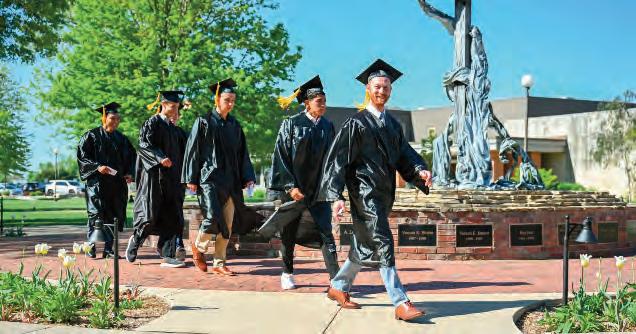
| Read longer versions of these and other articles at christianleadermag.com |
MB Foundation has released its 2024 Annual Report, highlighting another year of kingdom impact in partnership with more than 2,000 clients across 39 states.
In 2024, MB Foundation facilitated over $11 million in donor distributions, supporting 518 charities—from local churches and mission organizations to education institutions and conference ministries. The year marked the first cryptocurrency gift given through MB Foundation, demonstrating the creative ways donors are choosing to be generous with their resources.
Other 2024 highlights include: $370 million in assets under management, 10.50 percent return on the standard endowment strategy, $136 million loan portfolio—the largest in MB Foundation history, and 912 investors.
MB Foundation also contributed a record-breaking gift of $309,101 to USMB, pushing its total Firstfruits gifts to USMB beyond $2 million. Additional grants helped to benefit pastor and church ministry efforts. New resources were launched in 2024, designed to teach children and millennials about stewardship.—MBF
Twenty-eight Central District pastors, spouses and children attended a retreat April 25-27 at the Castaway Club near Detroit Lakes, Minn.
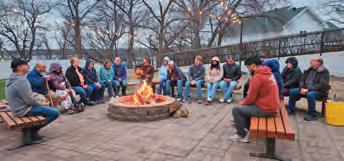
Tony Randall, pastor of Lincoln Hills Bible Church in Sioux Falls, S.D., shared three messages on the theme “Encouragement for the Task,” based on 2 Corinthians 4:16.
The retreat also included small group discussion, games and a time of sharing by Delmar and Tammy Yoder, former pastoral couple at Strawberry Lake Mennonite Church (SLMC), Ogema, Minn. Jose Gonzalez and Paola Perez of Iglesia Agua Viva in Omaha, Neb., and Mike Lotvola, SLMC, led times of worship.—CDC
Tabor College in Hillsboro, Kan., held an April 30 groundbreaking ceremony for its new Business and Entrepreneurship Center.
Fundraising reached a significant milestone with the announcement of a $1.3 million challenge grant from the Mabee Foundation. To receive the money, Tabor must raise an additional $1,383,972 by Jan. 14, 2026.
Nearly $9 million has been raised toward the $11 million project, and less than $500,000 remains to meet the challenge grant issued by the Mabee Foundation in January.
The building is part of Tabor’s $90 million Next Century Campaign. To learn more, visit www.tabor.edu/nextcentury.—TC
Connie Faber’s last day before her retirement as editor of the Christian Leader was past, but there was still the matter of packing up the office. For 31 years, Faber and the entire collection of books, resources and records for the magazine had occupied an office in Hillsboro, Kan. Amid the books waiting to be sorted, an assortment of partially filled boxes and the dwindling folders in her file drawers, Faber took a few minutes to reflect on her time with the magazine.
What have you found fulfilling in your work?
It’s always fun to help someone tell their story or their church’s story. I loved working with writers to help them better say what they wanted to say, even though it can be intimidating to let somebody else read your writing. Some of the best moments have been working with good, experienced writers and hearing them say that a change I recommended made the essay sing. I have been able to use the skills and abilities that God gave me and to meet lots of people and learn to know our MB churches. And I got paid for it!
Is the editor’s job a lonely job, especially since the USMB staff is not in a central office?
Having coworkers in the same building would be nice, but email, phone calls and video conferencing help us stay connected between our in-person staff meetings. Being the editor in some ways is solitary work, but I have friends all over from attending national and district events and from doing phone interviews and working with writers. I’ve gotten to know a lot of church secretaries who helped me gather information or track down a pastor. It would be fun if we had an unlimited budget to travel to report on the churches
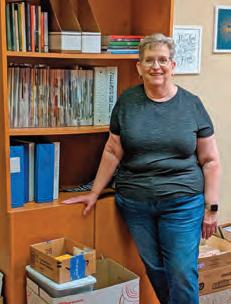
in person, but I was OK doing it by phone and email.
How has the Christian Leadershaped the conference?
In 40 years of readership surveys, people have consistently said the role of the Leader is to connect the churches and keep U.S. Mennonite Brethren informed about each other. I think we shaped the conference by reflecting the people in the pews. I hope we sometimes guided the discussion, but more often we reflected the different viewpoints and perspectives within the churches. The Leader is also a place where Mennonite Brethren talk about what is going on in the larger Christian landscape— issues such as the emerging church, our response to terrorism and generational trends.
Do you have any regrets about what you’ve published over the years?
I have gotten in trouble a couple of times, but I’ve never regretted something we’ve printed, except maybe one mistake when I was the assistant editor. It was the first article reporting on USMB church planting in Utah. Through the whole article, instead of the LDS acronym for Latter Day Saints, I wrote LSD. Nobody caught the error until we saw the magazine in print. All we could do was laugh.
Interview by Kathy Heinrichs Wiest

The Canadian Conference of MB Churches (CCMBC) has more than 220 churches across Canada in both rural and urban settings of people who seek to follow Jesus. Its mission is to cultivate a community and culture of healthy disciple-making churches and ministries, faithfully joining Jesus in his mission.
CCMBC exists to resource its churches through par tnerships with six provincial conferences, located in Quebec, Ontario, Manitoba, Saskatchewan, Alber ta and British Columbia. It also has established national agencies: MB Seminary, CCMBC Legacy Fund, and, in partnership with USMB, Multiply. CCMBC also provides services and resources through the Centre for MB Studies and Kindred Productions.
New churches are being welcomed into CCMBC every year, like Road 316 in Winnipeg, Man. This Russian-Ukrainian church plant started in December 2024 and seeks to reach the 4,000 to 5,000 new Ukrainians who have recently settled in Winnipeg because of the ongoing conflict in Ukraine. Many of these newcomers are looking for ways to integrate into Canadian culture, learn English and find community.
In partnership with Eastview Community Church, Road 316 hosts an English conversation class, followed by a fellowship time and worship service. Please pray for Road 316’s leaders Denis and Albina Nikitin as they shepherd this ministry, and for its congregation members, many of whom are affected by the trauma of war. Pray that God
• Canada is the second-largest country in the world, with 9.98 million square kilometers.

Volunteers at The Community Table sort and shelve food received from a food drive.
will continue to use Road 316 to bring the peace and hope of Jesus to all who participate in its ministry.
Many churches across Canada are also discovering their unique purpose in their neighborhoods, such as The Gathering in Ottawa, Ontario. After much prayer and information-gathering, the church launched The Community Table, a food distribution ministry, despite not owning their own building and being in a seemingly affluent suburban neighborhood.
After starting this ministry a year ago, The Community Table has grown to serve 50 households every month. Please pray for The Community Table as its ministry continues to grow. Pray that its practical needs would be met and that those accessing services would not only receive food but also the kindness and love of Jesus.
Thank you for supporting the ministries of CCMBC. You can learn more about the MB story in Canada by subscribing to the MB Herald (www.mbherald.com).
• Canadian James Naismith created basketball in 1891. The first game of basketball used a soccer ball and two peach baskets as equipment.
• Canada boasts the world’s largest moose population, in excess of 1 million.







Four ways God can renew our minds
An expert in the law asks Jesus to name the greatest commandment. Jesus answers, “‘Love the Lord your God with all your heart and with all your soul and with all your mind.’ This is the first and greatest commandment. And the second is like it: ‘Love your neighbor as yourself.’ All the Law and the Prophets hang on these two commandments” (Matt. 22:36-40).
The “first and greatest” commandment. Let that sink in. What could be more important to us? God rescues us from a life of rebellion and instructs us in how to live in a new way. The intent of this greatest commandment is clear. We should love God with every part of our lives, including our minds. What does it mean to love God with all our mind?
Before answering that question, we need to make clear that loving God with our minds is not the only thing that followers of Jesus are called to. At times, Christians have fallen into the trap of “doctrinalism,” thinking that being a disciple simply involves believing the right things. Believing and understanding orthodox doctrine is an important part of loving God with our minds. But the greatest commandment is bigger than getting our theology right; it calls us to love God with all our mind. And loving God with all our mind is much bigger than theology.
We also need to remember that our minds—like everything else in God’s creation—are distorted by human sinfulness. This distortion takes place in many ways. For instance, our desires become disordered. Desires are an important part of our minds. They are part of God’s design for human flourishing. Without an innate desire for food, without hunger, our ability to survive would be reduced. Without the desire to enjoy food, our experience of God’s good creation would be damaged.
Another way that our minds can be distorted is by using the great gift of reason in the wrong ways. Humans can reason. But the ability to reason is not what it means to be created in God’s image, as some Christians have said. The ability to reason comes in degrees; some people are better at it than others. At some times in life—in infancy or after dementia—our ability to reason is virtually non-existent. But all people, regardless of their cognitive capabilities, are created in God’s image.
Nonetheless, the level of reasoning that humans are capable of is qualitatively different from any of God’s other creatures. And sometimes we misuse this gift. Sometimes we use our minds to manipulate other people. For instance, we use the knowledge of another’s fear to get that person to do something that we want them to do even though it might not be the best thing for them.
By David Faber
Think about an extended car warranty robo-call. The caller identifies a fear and then presents seemingly logical arguments for how to make you safer. But usually, the solution only benefits the warranty company.
Sometimes we use reason to avoid taking responsibility for our actions. Both Adam and Eve tell God why they are not responsible for their own disobedience. Similarly, Aaron tries to persuade Moses that he is innocent of the charge of making an idol in the story of the golden calf. Often defensiveness is our first response to being called out for some action; we try to use reason to show that it was not our fault.
Given that our minds are corrupted by sin, we need healing. In Romans 12, Paul first commends us to give our whole selves to God as living sacrifices (which sounds like the greatest commandment) and then writes, “Do not conform to the pattern of this world, but be transformed by the renewing of your mind. Then you will be able to test and approve what God’s will is—his good, pleasing and perfect will” (emphasis mine). Through the healing of our minds, we will be changed from rebellious, disobedient traitors to obedient citizens of the kingdom of God.
How does this transformation of our minds take place? Paul identifies one clear pathway: “Finally, brothers and sisters, whatever is true, whatever is noble, whatever is right, whatever is pure, whatever is lovely, whatever is admirable—if anything is excellent or praiseworthy—think about such things” (Philippians 4:8, emphasis mine). We renew our minds by changing what we immerse them in. Our minds are shaped by what we think about.
This is not as easy as it sounds. How do we discern what is true, noble, right, pure, lovely, admirable, excellent or praiseworthy? Here are four things to remember as we seek to renew our minds. These are not the only things we can do, but they are a starting point.
1. Remember that good is all around us. Even though the world is still rebellious, God providentially cares for all humanity and all creation. Jesus says, “God makes it rain on the just and the unjust” (Matt. 5:45). Both believers and unbelievers
produce things that are true, beautiful and good. We should expect to see excellence around us.
2. Remember that renewing our minds will likely be hard. In the parable of the lost coin (Luke 15:8-10), a woman lights a lamp, sweeps carefully and searches until she finds the lost coin. This parable is about God’s search for lost people. But perhaps it is appropriate for us to search in the same way for the excellent and praisewor thy gifts that God has provided for our minds.
Sometimes the result of the search is hard. Finding what is true can be painful. Imagine King David when, after sleeping with Bathsheba and murdering her husband, he is confronted by Nathan. Nathan tells David a story of a rich man who abuses his power over a poor man and steals the poor man’s prized possession. David is outraged and demands to know who the rich man is. Nathan replies, “You are the man” (2 Samuel 12). The truth is sometimes hard to face.
3. It is important to search in community. As the story of David and Nathan suggests, it is impor tant to search together for the good, the true and the beautiful. Sometimes we cannot see the good around us because of some lack on our par t. Our communities can fill in the gaps of our knowledge. This aspect of renewing our minds requires honesty, humility (we have to acknowledge that we don’t know it all) and trust. Our churches should be places where humble, honest, trustworthy conversations take place.
4. Remember that sometimes the true and the good are hidden. A retired Mennonite Brethren pastor was asked how he handled unfair criticism. His response was that even the most unfair criticism contains at least a grain of truth. He tried his best to figure out what that truth was and to learn from it. Sometimes the renewing of our minds will help us to uncover truth, goodness, nobility, beauty, excellence or praiseworthiness that would have otherwise remained invisible.
David Faber is professor of philosophy and religious studies at Tabor College. He attends Ebenfeld MB Church, in Hillsboro, Kan.
The intent of this greatest commandment is clear. We should love God with every part of our lives, including our minds. “ “

By David Janzen and André Stephens
Mennonite Brethren in the U.S. took bold, visionary steps when they established Tabor College in 1908 and Pacific Bible Institute, which later became Fresno Pacific University, in 1944.
“It is hard to exaggerate the Mennonite Brethren commitment to education,” write Paul Toews and Abe Dueck in For Everything a Season: Mennonite Brethren in North America, 1874-2002 – An Informal History.
With over 40,000 combined alumni, these institutions may be the most impactful ministries launched by Mennonite Brethren.
Tabor and FPU alumni expand Christ’s kingdom worldwide. Through business, education, medicine, missions, ministry and more, alumni lead and transform families, organizations and communities thanks to the combination of spiritual formation and professional preparation experienced at our schools.
Our MB churches and agencies reflect the influence of our colleges. Hundreds of FPU and Tabor alumni have served and are serving in MB churches. Alumni have provided key leadership in new and mature church plants such as Renewal in Rapid City, S.D.,
SouthLife in Wichita, Kan., and Copper Hills in Peoria, Ariz. Nearly all current U.S. Multiply mobilization staff and global workers from the East of the Rockies and the Western U.S. regions attended Tabor or FPU.
Enrollment trends and impacts
Christian colleges face significant challenges, including increased skepticism about the cost/value of a college degree, rising student debt, declining birth rates, diminishing state and federal funding and new educational delivery methods. Additionally, Christian colleges must navigate denominational decline and alumni engagement.
A student’s first year away from home is often critical as they wrestle with identity, beliefs and calling. However, in recent decades, economics have trumped spiritual and character formation. According to Shirley Hoogstra, former president of the Council for Christian Colleges & Universities, “Higher education used to be about developing the whole person for service to the nation. Today the driving question is not, ‘What is my purpose in life?’ but, ‘Will I get a job?’ and, ‘Will I be
able to repay my loans?’ The driver is more and more an economic one.”
Culturally, even evangelical Christian families have shifted. Although 75 percent of Christian parents value the “strong spiritual formation” of a Christian college or university, 67 percent of them prefer public institutions for perceived career prospects.
We see this trend reflected in our enrollments and particularly among MB constituents. Among those students who declare a denominational affiliation, Catholics now form the largest represented church background at 12 percent (Tabor) and 18 percent (FPU). These same statistics show the percentage of students from MB churches declined at Tabor from 45 percent in 1986 to 8 percent in 2021 but has recently risen to 11 percent. FPU currently enrolls fewer than 5 percent from MB churches in traditional undergraduate programs.
These cultural shifts correlate with young Christians increasingly leaving the church during their college years. A 2018 Barna survey revealed that 64 percent of students who professed to be Christians in high school had “dropped out of attending church after going regularly.” Barna projects that 80 percent of individuals raised within the church will become “disengaged” from their faith by the age of 29.
There is hope, and FPU and Tabor are key elements of the solution.
We live in a complex and anxious age. Yet, it is a great time to be alive. Researcher and educator Alexander Astin observes that “while it’s obvious technical knowledge and skill are becoming increasingly important for effective functioning in modern society, better technical knowledge alone will not equip students to deal with many of society’s most pressing problems: violence, poverty, crime, divorce, substance abuse and the religious, national and ethnic conflicts that continue to plague our country and our world. These are problems of the heart, problems that call for greater self-awareness, self-understanding, equanimity, empathy, concern for others and well-being.” Our institutions engage not only the intellect but the heart.
As institutions dedicated to higher education, we navigate the tensions between training for specific careers, more general skills for success such as written and oral communication, and the broader pursuit of wisdom through Christian studies and the liberal arts. In a rapidly changing world, godly wisdom is needed more than ever. Recent advances in Artificial Intelligence have many business leaders calling for a resurrection of the liberal arts.
Combining technical knowledge with the ability to communicate, analyze, interpret and work with integrity, compassion and understanding are our strengths. Faculty and staff are deeply committed to shaping students not only as professionals but as compassionate and wise citizens who engage their communities with faith and purpose.
While FPU and Tabor are not churches, we come alongside the church in fulfilling both the Great Commission and the Great Commandment. Students come
from around the world (39 states and 31 countries at Tabor; 20 states and 19 countries at FPU). Thanks to open enrollment policies, some of these students are not Christians and every year, many make first-time decisions to follow Jesus.
Students deepen their faith through Bible courses, chapel attendance, faith-integrated learning, mentoring and co-curricular experiences that bring the gospel to life. Alumni spread throughout the world, many taking the good news of Jesus to communities and nations.
Tabor and FPU provide high-quality programs at competitive costs. Students can explore relevant in-demand majors such as business, computer science, education, nursing, pre-health sciences, psychology and social work. Students and families don’t have to choose between spiritual formation or career preparation. They can achieve both at Tabor and FPU.
FPU continues to explore exciting new methods to serve its region and beyond. California’s Central Valley presents rich opportunities by virtue of having one of the state's lowest bachelor’s degree attainment rates. Residency programs to prepare teachers and school counselors and scholarships for MB students are among the ways Fresno Pacific is strengthening and expanding its traditional, graduate and seminary programs. This includes expanding our adult degree completion program—one of the fastest-growing sectors of higher education—and increasing certificate and course offerings through our Continuing Education Division, which has a national reach. Working with so many student populations helps the university weather demographic shifts and increases institutional stability.
For Tabor, new academic programs are energizing new enrollments. Undergraduate programs in computer and data science, data analytics, entrepreneurship and nursing complement strong existing programs in the sciences, education, psychology, social work and health and human performance. The new M.Ed. in Neuroscience and Trauma along with new concentrations in the MBA have elevated graduate enrollments to record numbers. A novel graduate studies in ministry program is launching in Fall 2025 through a collaborative effort with the Southern and Central districts to prepare more pastors and lay leaders. In 2020, Tabor introduced the generous Tabor 20 scholarship to encourage MB students to enroll. This is working, and the percentage of MB students has consistently increased.
We invite you to be part of the solution. Pray for your colleges. Pray for our students and staff. Come visit. Encourage young people to schedule a campus visit. Support FPU and Tabor financially. Together we can continue to expand Christ’s kingdom through Christian higher education.
David Janzen is president of Tabor College and André Stephens is president of Fresno Pacific University. Tabor is owned by the Central, Eastern, LAMB and Southern district conferences. FPU is owned by the Pacific District Conference.




Abby Andres, who graduated from Tabor College in May, excitedly considers her future. “I love kids and feel very called to teaching,” she says. “I want every student that comes into my classroom to feel the love of Jesus through me since every student deserves to be loved no matter their situation or behaviors.”
A friend who teaches young children recently confided, “I’m just so tired. In 24 years of teaching, I’ve never had a classroom of students quite like this one. If I can just teach one more year, I can think about retiring.”
Such a contrast, but somehow it is not surprising. It seems inevitable that an upcoming starry-eyed teacher might feel weight and discouragement after years of teaching. What can we do to help? How can we support and encourage our teachers and students?
We can pray. Prayer may feel like wasted time— nothing tangible, visible or created comes after time in prayer. Or does it?
Almost eight years ago, another mom invited me to join a Moms in Prayer group. This organization desires that prayer cover every child, teacher and school around the world. Little did I know this invitation would shape my life and the lives of others in countless ways.
In the years since, I’ve prayed for teachers and students in home, private and public schools; I’ve prayed for my own children and the children of others. I’ve gathered prayer sheets full of heartbreak, joy, cries for unity, conviction and repentance. My prayers to God over bonds built with other praying
moms and concern for the trials of teachers will last far beyond anything I see today.
The needs facing students and teachers today can seem endless, and one might wonder where to begin. Praying Scripture can provide a tangible pattern to follow. Lori Schumaker, a prayer advocate, says, “When we pray Scripture, we are praying God’s words back to him. He takes seriously and answers powerfully. We remind God of what he has said to us and pledged to us. It’s powerful.”
Children daily navigate an abundance of information, influence and conflicting worldviews. Anxiety, fear and uncertainty threaten peace, security and truth.
My sister, Tiana Alden, a mother of three living in Tennessee, describes the complex feelings she has for her children in light of recent public school threats. “Sending our kids off to school with a prayer of peaceful covering can protect them from fears that creep in with the stories and experiences of senseless violence that have sadly become the cultural norm,” she says.
Krista English, a friend and homeschool mom of 18 years, says, “My prayers for my children are often centered around praying for their character and the influences around them. I pray they persevere through school frustrations; that they be teachable, willing to work on learning; and develop a love for learning new things.”
We can follow Philippians 4:6-7 as we pray for a student to walk in the confidence of the Lord. “God,

may ________ not be anxious about anything, but in everything by prayer and supplication with thanksgiving let his/her requests be made known to God. And the peace of God, which surpasses all understanding, will guard ________’s heart and mind through Christ Jesus.”
Have you asked a teacher how to pray for them?
Ally Hauge, from Kingwood Bible Church, is an elementary teacher who has also worked in administration. She says, “I would love prayer for Christ to shine through me in all my interactions with students, families and staff…and that I would be able to balance consistency with grace, holding students to high expectations while also meeting them with understanding and compassion.”
Can you hear the longing and desire of our teachers to love and serve others with endurance, faithfulness and integrity?
An example prayer comes from Proverbs 2:10, “God, may wisdom enter _____’s heart, and may knowledge be pleasant to his/her soul.” Can you pray this over a teacher you know?
Teachers feel the weight of their chosen occupation. What a privilege to support them through prayer. Sharon Odgon, who also attends Kingwood Bible Church, has spent 24 years in a bilingual classroom. “If I knew someone was praying for me, I would not feel so alone. I would know I had someone to contact on the most difficult days,” she says.
We can pray Hebrews 13:21 for teachers: “God of peace, may you equip ______ with every good work for doing your will, and may you work in ______ what is pleasing to you, through Jesus Christ, to whom be glory for ever and ever. Amen.”
Sarah Murrell teaches part time at a charter-school and serves as Kingwood Bible Church’s Children's Ministry director. She appreciates hearing that parents pray for her and that they recognize her allegiance is to God above all else.
“It has been discouraging when Christian parents assume my values must align with the values of a particular administrator or state-level leadership,” she says. “Pray for believing teachers, that we will have the wisdom to respect the leaders above us while maintaining our Christian convictions with both grace and truth.”
“The needs facing students and teachers today can seem endless, and one might wonder where to begin.”
Do you know a teacher who finds themselves in a workplace that battles their personal values? Do you know a teacher who has chosen to love students above their own comfort? You could pray from Psalm 35:1-2: “Lord, may you contend with those who contend with (challenge) ; may you take up shield and armor; arise and come to his/her aid.”
Our earnest prayers make a difference. God works miracles in the lives of our children, in schools and in us. Our prayers not only make a difference in our own lives, but in those we pray for.
One teacher we can pray for is the unbeliever, unpopular or disliked teacher. Instead of gossip or disparaging remarks, let’s pray for this person and challenge students to show the love of Christ.
In eighth grade, my daughter, Livia, was determined to show love and kindness to a teacher most peers disrespected. Livia wrote simple cards, gave small gifts on holidays and always tried to come and go from the classroom with a smile. This teacher took note and at graduation mentioned how Livia treated her with respect. If my daughter could treat a difficult teacher this way, I could, at a minimum, add my prayers.
We can pray for a student’s witness using Colossians 3:12: “God, as your chosen one, holy and dearly loved, may ________ clothe himself/herself
with compassion, kindness, humility, gentleness and patience.”
A prayer for a difficult teacher comes from Acts 26:18: “Open _____’s eyes and turn him/her from darkness to light and from the power of Satan to God, so that ______ may receive forgiveness of sins and a place among those who are sanctified by faith in Jesus.”
Instead of tearing down teachers, administration or policies, we can bring the matter to God. Turning frustrations into prayer can make an eternal impact and can also change our heart and attitude.
Sally Burke, president of Moms in Prayer, says, “Prayer is inviting his presence and power into our lives. It is the greatest power available to God's children.” Time in prayer is never wasted. Let’s take time to access the gift of prayer and lavish it over teachers and students.
My heart has been softened and awakened to the needs of teachers and students through prayer. I have seen lives changed, teachers supported and paths made straight. Perhaps God calls you to participate and encourage a student or teacher through prayer today.
Kelsey Ensz and her husband, Nathan, pastor of Kingwood Bible Church, live in Salem, Ore.
For most households with school-age children and teens, summer marks a pause in the school-year routine. Summertime is a chance to rest and recharge before diving into another year of learning. In this issue, we invite readers to take advantage of the break to consider several topics related to education. In addition to the articles in the print magazine, several articles are published online.
Read online at www.christianleadermag.com
Put on your thinking cap by David Loewen, Joanne Loewen and Tena (Loewen) Roehrich
Parents are faced with more choices than ever regarding their children’s education. There are various public and private school options as well as home schools, each seeming to claim an advantage over the others. What should parents consider when choosing which option is best for their children?
The ABCs of partnership by Shirley Fransen Holm
Seven years ago, Butler Church in Fresno, Calif., began a partnership with a local elementary school to provide mentoring for first graders who struggle with reading. In this article, Shirley Fransen Holm shares how the congregation began the literacy mentoring program and how it’s grown to serve the families in their neighborhood.
God is good, no matter what
Ireacheda turning point in my life when my wife and I struggled with infertility. We always expected just to be able to have kids. We could afford it, had a good home, and are good people who would try our best to be good parents. But we tried unsuccessfully for years to have a second child, and this weighed heavily on me, my wife and our relationship.
Struggling with infertility was a new challenge for us. I come from a family of four kids and my wife from a family of two kids. All three of my sisters had kids, and my sister-in-law had children as well. My wife and I were also successful with our first pregnancy, so after trying and losing multiple children during pregnancy, it became apparent there may be an issue.
Both of us went through testing for about everything imaginable with no solid conclusion as to why these things were happening. I felt lost and hopeless. It was strange because normally, you go to doctors and they give you answers, but we got none! This took a massive toll on me, emotionally, and my wife, physically. It also took a toll on our relationship because it began to feel transactional. We had rules and schedules to follow to try for a successful pregnancy,
and it felt like we lost who we were together.
About this time, my wife suggested we start attending church. I was a nonbeliever but agreed to attend church to appease her. To my surprise, being in church and hearing the Word provided relief through our struggles. So many words rang true, and I became curious to hear more.
My curiosity led me to download the Holy Bible app, and I started reading the Bible every day, and it turned my life around. Reading about people’s sacrifices and struggles gave me faith that Jesus could turn everything around.
At the time, I was leaning heavily on drinking to ease my pain, and I realized that this was not who I wanted to be or how I wanted to handle life.
I have spent the last couple of years getting familiar with myself and my belief in Jesus. My sacrifice will never compare to his, and I willingly give myself to Jesus as a small gesture of my faith and gratitude. This has led me to feel content and excited for new days and adventures. I pray for things small and large with no more shame.
Though it has been difficult, my wife and I have accepted that it is God's plan for us to focus our love and energy on just one child. This was the hardest decision we have ever made, but going to church
and reading Scripture has helped my wife and me realize that it is not about our plan; it is about God's plan, and we just have to continue to live it.
God has a plan for every second of every day, whether we like the plan or not. I am still learning to accept that no matter what happens, God’s plan is good, and we will be OK.
God has a plan for every second of every day, whether we like the plan or not.
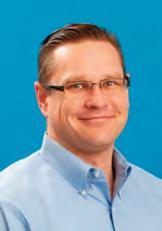
Gary Neale Simpson Jr. and his wife, Jennifer, have one daughter. They attend South Mountain Community Church in Draper, Utah.
Asa kid, I once threw a toy and accidentally broke our kitchen chandelier. In my infinite wisdom, I hid under a countertop 3 feet from the scene of the crime. Needless to say, I was found quickly.
Hiding feels like it works, but it doesn’t.
In the book of Jonah, God calls his prophet to preach to Ninevah, but Jonah doesn’t want to go. So, Jonah tries to hide from God. He flees, encounters a storm, gets swallowed up by a giant fish, gets vomited out, and then reluctantly preaches to Ninevah.
Hiding from God feels like it works, but it doesn’t.
We often focus so much on Jonah getting swallowed by the fish that we miss the point. The book of Jonah holds a mirror up to the readers' souls. If we’re willing to take an honest look, we’ll find that we are much more like Jonah than we would like to admit.
Jonah did not want to obey God, so he fled. We read this and think it is ridiculous that Jonah is trying to hide from God. But will we take an honest look in the mirror? Don’t we do the same things? Fleeing to Tarshish was a blatant attempt to hide from God’s will. We often put more sophisticated trappings on our attempts to hide from God.
We pray less. We attend church less. We make our lives busy. We focus on the commands we like and ignore the ones we don’t. We don’t call it hiding from God. But at the end of the day, when God gives us commands and we don’t obey, are we any different than Jonah?
Grace is prevalent in every part of Jonah’s story. The wicked people of Ninevah received God’s grace when they did not deserve it. God’s response to Jonah (the prophet who fled from God and did not want Ninevah to receive God’s grace) was to firmly call Jonah to obey him while lavishly pouring out his grace upon Jonah.
We, like Jonah, sometimes ignore the commandments of God that we don’t like. God’s response to us is the same. He does not remove his commandments when we dislike them. In his goodness and wisdom, God still holds firm to them. Just like he gave grace to Ninevah and Jonah, he extends that same abundant grace to us, as well.
Are there commands of God that you choose to ignore? Do not gossip? Go and make disciples? Have no other gods? That one command you just wish God didn’t give us?
We can judge how ridiculous Jonah was for trying to hide from God, or we can realize that we do the same thing, just in more so-
phisticated ways. May we be like the people of Ninevah who are convicted by God and repent of their ways. May we trust God’s ways even when they don’t make sense to us. May we be obedient when it is not easy.
May we also marvel that God is gracious and compassionate, slow to anger and abounding in love, relenting from treating us how our sins deserve (Jonah 4:2).
The book of Jonah holds a mirror up to the readers' souls. If we’re willing to take an honest look, we’ll find that we are much more like Jonah than we would like to admit.

When is it time to change?
teams from local churches circled the field to pray before their final games of the season and of their longstanding competition. After more than a decade, the participating congregations had discerned it was time for their formal league to end. They ended their tradition with a fun day of sportsmanship and ice cream and thanked God for a meaningful time.
Like the softball league, many of us are asking, “When is it time for a church community to change a tradition?” And with that, “How do leaders help people adjust well to those changes?”
The book of Ecclesiastes reminds us “there is a time for everything, and a season for every activity” (3:1). Not everything can or should be changed—like our commitment to follow Jesus—but our communities need to be open to God’s direction in all things. Churches seek discernment in where and when to gather, what events to host, even what music style to use in corporate worship.
Lead Pastor Jeremy Jordan of Cross Timbers Church in Edmond, Okla., has helped his community prayerfully navigate various changes. “Traditions are good when they keep us tethered to the truth of Scripture and keep us aligned with the Great Commission,” Jordan says. “However, we must be careful that the desire for nostalgia or comfort doesn’t allow us to wane in our
pursuit of Jesus and our obedience to him.”
Jordan encourages churches to start by asking questions about their traditions: “Is the tradition holding us back from fully embracing the purpose Jesus gave to the church? Does the tradition take the spotlight away from Jesus?” Answering honestly will help a community discern if they are doing what God has called them to or if they have gotten stuck.
The leadership team at Buhler MB Church in Buhler, Kan., asked these questions and sensed God was inviting them into something new with their Sunday morning schedule. The team, including Pastor Curt Vogt, brought forward the idea of swapping the order of the worship service and Sunday School to better serve their congregation.
“Communication is huge,” says Vogt, so the group shared their reasoning. “We welcomed church people's questions, comments and concerns” to let them know “they mattered and were part of the process.” After a time of continued conversation and prayer with groups and individuals, the congregation agreed and made the switch. It has been a positive change.
Whether God is asking a church to maintain or change a tradition, trust the Holy Spirit is at work. This includes being aware of things Jordan describes as having become “sacred cows”—a tradition a group protects in spite of God’s calling, as the Israelites did in Exodus 32—and
let them go. Vogt reminds leaders that “it’s important not to rush the change” and to receive grace in the process. In that, we can celebrate that “(God) has made everything beautiful in its time” (Eccl. 3:11a).
Whether God is asking a church to maintain or change a tradition, trust the Holy Spirit is at work.

Caitlin Friesen, a graduate of Fresno Pacific Biblical Seminary, is married to Ben Friesen and is part of Cornerstone Community Church in Topeka, Kan.
Internships give young adults valuable ministry experience, training
Internships are one opportunity for young adults interested in vocational ministry to gain experience while in college and explore their call to ministry. The Christian Leader talked with four young adults currently serving local Mennonite Brethren churches about their internships. Their advice to
Jillian Balakian, Reedley (Calif.) MB Church, is a junior at Fresno Pacific University, majoring in music with a minor in Christian ministry leadership. She has served as a student chaplain, led worship in chapel, been in ensemble choirs and is involved in leading mission/outreach opportunities. Balakian, currently serving at Mountain View Church, plans to work in local or global church ministry when she graduates.
others interested in vocational ministry? Get ministry experience in high school and college. The interviews were done through email and are edited for length. Read the full interviews on the CL website (www.christianleadermag.com).

What have you learned from your leadership experiences at FPU?
I've learned how to lead out of a servant's heart, whether in outreach or having conversations when it may not be an ideal time for me. I've learned— but not mastered—that Jesus calls us to serve who we're leading and to lead out of humility.
Describe your internship at Mountain View Church.
I applied on a whim for an internship at Mountain View for the summer of 2024, and it was the best summer I ever had. I worked as a worship intern and helped with outreach. I felt encouraged and affirmed in my calling. It was very hands-on, so I
learned what it means to work full-time in church. This internship was important to me because I found a new church family and a place to regularly serve where I felt I belonged. Mountain View affirmed me in my leadership, grew me in my faith and giftings, and gave me experience in leading through the guidance of the Holy Spirit.
What would you encourage a young person to do to prepare for vocational ministry?
Serving as an intern at your local church is the most encouraging and helpful thing you can do to prepare for a full-time ministry job. Connecting with short-term missions can also train you locally and globally. This is the best way to see your strengths and things to work on as you prepare for full-time ministry.
Sebastian Mireles, a 2024 Tabor College graduate, has a degree in business administration with an emphasis in management and marketing. But Mireles knew he would be involved in ministry, vocationally or as a volunteer. Thanks to his involvement in youth ministry and a summer internship, today Mireles is the full-time youth pastor at Bethesda Church in Huron, S.D.
Describe your call to vocational ministry.
My call to ministry was heavily influenced by my time serving in the local church. During my college internship at Bethesda Church, I saw God’s calling on my life to serve the local church with the gifts he has given me. Tabor showed me the importance that the local church has in the life of a college student. My home church provided a foundation rooted in the gospel of Jesus so that when doubts and hard times arose, I was able to cling to the cross of Christ and its truth.
What did you learn from your various leadership experiences?
Having a heart for people to be brought from death to life has been the main thing that I have taken from my different leadership experiences. At the end of the day, ministry isn’t the programming or bells and whistles. It is the people themselves. Seeing people experience the joy of full salvation found in Christ Jesus drives and sustains me in the highs and lows of ministry.
How did the internship at Bethesda impact you?
The homebase for my internship responsibilities was with youth, but I experienced all facets of ministry that Bethesda offers—worship, recovery ministry, leading a mission trip, teaching/preaching and many things behind the scenes. I came into the internship not knowing fully what my calling
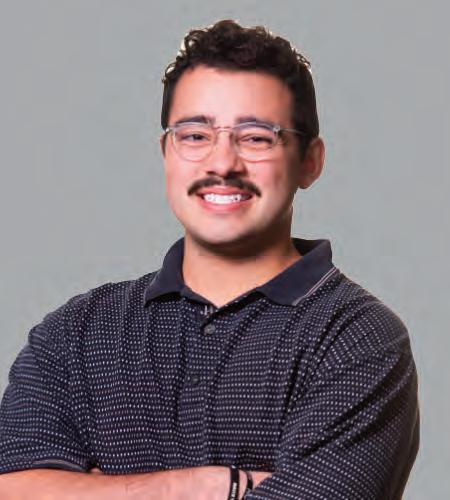
was, and I left with confirmation that my call was to full-time ministry. The experience was extremely valuable for me to know what I would be getting into if I was going to do ministry vocationally.
How can a young person prepare to work in a church setting?
My No. 1 encouragement is to not neglect personal holiness. Daily devotion to God in prayer, Bible reading and worship should be the No. 1 thing. Implement the daily spiritual disciplines found in Scripture into your daily routine. Don’t let your service exceed your worship.
“At the end of the day, ministry isn’t the programming or bells and whistles. It is the people themselves.”
Lexi Milne serves children and young families at her home church, Zoar MB Church in Inman, Kan., as the children’s ministry director. Milne, an intern at Hillsboro MB Church, will be a senior at Tabor College where she is majoring in music education.
Describe your call to ministry.
I have always been drawn to working with kids. I had the opportunity through local churches to volunteer at VBS and summer camps. While at Tabor, I was an intern at Hillsboro MB Church.
My internship at HMBC heavily played into my call to serve in children’s ministry. I loved interacting with the kids and seeing the depth of their understanding of who God is and what he has done for them. Kids have the capacity to receive the Holy Spirit and see God working in the world around them, and it’s so fascinating seeing how they understand God in different ways than we do.
What did your internship involve?
At HMBC, I did whatever needed to be done—graphic design, parent communication, teaching lessons, brain-
storming and planning events, leading worship and working in the sound booth. I also directed the kids Christmas program in 2024, which was a lot of fun.
What did you learn because of your internship?


I learned that ministry is hard. It’s hard teaching kids concepts that adults don’t understand, and it’s hard communicating the gravity of salvation without scaring kids. I also learned that children’s ministry workers are needed. Kids need accountability through the church; they need encouraging relationships in the church; they need friends in the church and someone has to foster these things or they won’t exist.
Why was an internship valuable to you?










This internship was valuable to me because it was real-world experience in ministry. You don’t know what ministry is like until you do ministry. I value the head knowledge that I (gained) but more than that, I value the relationships I built and the love of Jesus that I got to share. I am so grateful for my time at HMBC, and I highly recommend an internship.





What advice would you give a young person considering work in a church setting?
I would advise them to counsel at a Christian camp or find an internship in ministry. Get some field experience. It is also awesome to have a mentor in ministry if that’s something you see yourself doing in the future. Reach out and make connections.
Aaron Snowder will be a junior at Fresno Pacific University, majoring in Christian ministry. He is currently working part-time as a worship leader at Mountain View Church Sunnyside, Fresno, Calif. He hopes to continue in worship ministry and eventually move into full-time church leadership, writing and producing worship music to serve the local church.
Describe your call to ministry.
My calling to worship ministry began at my home church, The Well Community Church in Fresno, where I first discovered the joy and weight of leading others in worship. FPU has built on that by giving practical training and helping me grow in both leadership and character. Mountain View has given me opportunities to put all of that into practice in real time.
Tell us about your internship experience. I had the privilege of interning at Mountain View Church and am now on staff. My responsibilities included planning services, leading worship weekly, recruiting and training volunteers and working with the pastoral staff to help carry out the church’s vision for worship.
Through my internship and current role, I’ve learned how to manage a team, prepare both spiritually and practically for services, lead people through different seasons and navigate the challenges that come with ministry leadership. I’ve also learned that the greatest growth happens when you’re allowed to try, fail and learn from it with grace.
Why was an internship valuable to you?
The internship and now working parttime have given me real-world experience, helped me discover my strengths and weaknesses, and grown my confidence as a worship leader. I’ve learned that ministry is as much about relationships and mentorship as it is about music or planning.
What advice do you have for a young person interested in working in a church setting?
I would say, start serving now. Don’t
wait until you think you’re ready. Find a mentor, stay teachable and learn through doing. The best growth comes from being given real responsibility and learning how to navigate both success and failure with humility and perseverance.
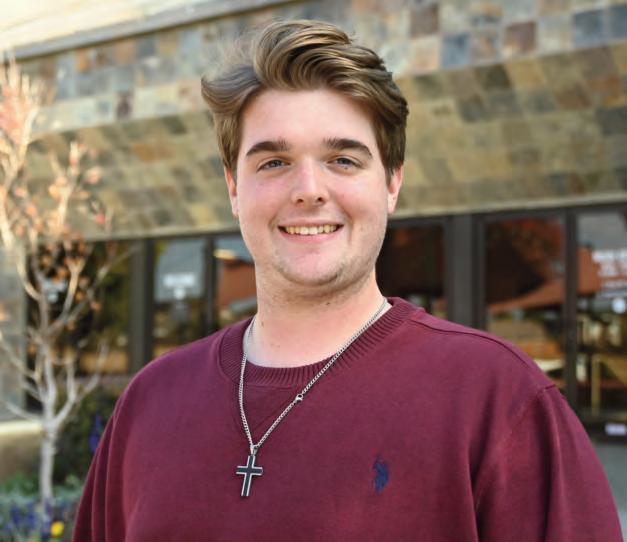








Be the bridge between local churches and global mission with Multiply.

Mobilize leaders, train disciples, and strengthen












Mostchurches have children’s ministry programs that meet on-site, but reaching kids outside the church’s four walls requires additional planning and energy.
Several churches across the country have found ways to reach local public school students where they are at as part of their mission to teach people about Christ.
A common framework used for reaching elementary school students with the gospel is the Good News Club, a ministry of the nonprofit Child Evangelism Fellowship (CEF). These clubs typically meet once a week after school for an hour and include music, games, Scripture memory and a Bible lesson.
Stephen Stout, pastor of Faith Bible Church in Omaha, Neb., began a club with his wife, Jane, in their home around 20 years ago for neighborhood kids. Shortly after their oldest son began attending Field Club Elementary, they moved their club to the school.
“We have had wonderful favor with the school,” says Stout. “The principal and the staff, they’re very welcoming of the Good News Club.”
Over the years, they have welcomed anywhere from 15
to 40 children in kindergarten through fifth grade to the club, which has been held in various spaces throughout the school.
Another Good News Club has been meeting for the last three years at Freeman Elementary School in Freeman, S.D., run primarily by volunteers from Salem MB Church.
Pastor Stuart Curry had been a part of CEF before moving to South Dakota. He believes the clubs are a unique opportunity for building Christ’s kingdom.
“God said to go and build disciples,” Curry says. “He didn’t say to wait until they show up at your church; he said to go, so we go. It’s an opportunity that we have to truly disciple them.”
In Dinuba, Calif., church members from New Life Community have a “long-standing relationship” with nearby Jefferson Elementary School, according to Pastor Brad Isaak.
The Good News Club there has been run in part by some retired teachers from New Life and serves between 20 and 25 children weekly.
“When we have opportunities to get outside of the church walls and meet our neighbors or add value in some way through coming alongside educators, coaches, school systems and administrators, we love to do that,”

says Isaak. “That enables us to share our faith, make connections and build trust in ways that are organic and good, and we think that’s part of the kingdom-of-heaven type of work that we want to be about.”
Ridgepoint Church in Wichita, Kan., sponsors two similar after-school clubs in the area they call simply Bible Club.
Rhonda Heerey runs the Bible Club at Cessna Elementary, which began in 2019 and serves around 75 kids. Students are divided into groups by grade and participate in music, games, lessons and crafts.
“A lot of these kids for various reasons are not coming through the doors of our church, and we have the opportunity to take Jesus to the school,” says Heerey. “You have a mission field right in your city, at your school, if you’re willing to find the workers to do that.”
Heerey says they also find ways to meet material needs such as donating coats for students and providing meals and treats for school staff occasionally.
In Minnesota, students from FrazeeVergas Elementary have the opportunity to receive an hour of religious education during the school day thanks to the state’s “release time” program. The law requires that students leave school grounds in order to receive the education; those who choose to opt in to the program can choose from various churches of different denominations in the area that offer instruction.
Teresa Birky of Lake Region Mennonite Church saw a need for a teacher for the program in 1986 and volunteered her time for nearly 30 years before pastor Jesse Swiers took over several years ago.
Birky says that while some of the students who attended her group were from their church, it was also an opportunity to get to know other kids from the community.
In Lodi, Calif., students from Vinewood Community Church are involved in lunchtime gatherings they call Christian Club at both Millswood Middle School and Tokay High School.
Associate Pastor Joe Broesamle explains these clubs are primarily student-run, but that he or youth pastor Nick Galtman are usually present and able to offer support or guidance if asked. The gathering usually involves a devotional or Bible study, discussion and occasionally, a speaker.
“We do it as a place for our students to have an opportunity to invite their friends on campus to come to something that’s low-key, not as intense as showing up at a church,” says Broesamle.
The schools are required to allow student-run clubs of any religion, provided they follow formal guidelines set forth by the school.
Broesamle believes that one reason public school staff and administrators are supportive of Christian clubs on campus is the ever-present need for students to have positive adult role models and constructive ways to spend their time.—Jessica Vix Allen
Twenty-four churches replied to a CL survey asking about partnerships between churches and local schools. This summary of their responses provides a list of creative possibilities for other congregations.
Let’s pack 25,000 school kits for 25,000 kids around the world!
Win a pizza party! Join our social media contest. Find details and more here. mcc.org/make-kits


California congregation assists South Dakota church plant with summer youth event
Forthree years, two Mennonite Brethren churches— more than 1,400 miles apart—have joined forces to give youth a fun-filled, truth-centered Summer Extravaganza. The week-long summer program is for youth in preschool through fifth grade and features worship, crafts, songs, games and snacks that correlate with the theme to ultimately point to the truth of the gospel.
Renewal MB Church (RMBC) in Rapid City, S.D., hosts the event each year with a mission team from Mountain View Church (MVC) in Fresno, Calif. MVC hosts its own Summer Extravaganza, and in recent years has helped RMBC begin its own.
“It’s a really exciting opportunity,” says MVC Children’s Pastor Gloria Wall. “It’s an event where anyone can help because you can incorporate so many random skills. There are so many exciting parts, but I think that definitely is one of them—seeing the body of Christ come together and reach kids in our neighborhoods here or in South Dakota.”
In mid-June, MVC for the third year helped RMBC host its Summer Extravaganza, along with parachurch organization Fellowship of Nations.
Michele Fiester, RMBC elder, is grateful for the body of Christ working together.
“We couldn’t do it without them,” Fiester says. “Really, I think three ministries coming together for one event is such an awesome testimony of how God can bring groups from different backgrounds and even locations for one ministry
for his glory.”
Summer Extravaganza isn’t the only link the two churches share. Michele and her husband, Pastor Jon Fiester, sought mentorship and training from MVC when planting RMBC, which built a partnership that still thrives today.
“Mountain View took us under their wing in leadership, discipleship, mentoring of my husband and me and training time in Fresno that gave us tools we could bring back and apply," Fiester says. "The support alone has been instrumental. They’ve also supported us financially over the years, kept our doors open and have given us the opportunity to have a great youth ministry. Mountain View has been one of our greatest champions, and we are really grateful for that.”
Michele Fiester says that while Summer Extravaganza draws 40-50 youth every year, youth are not the only ones impacted.
Fiester recalls the story of one neighborhood woman who showed initial hesitation to participate in church activities. Intentional conversation and love shown by a MVC missions team and RMBC women at last year’s Summer Extravaganza changed that.
“We connected with her and encouraged her to stay,” Fiester says. “Through her being here and having so many conversations, she came every day, then Sundays and now faithfully for about a year. That would be my highlight from last year.”—Caitlyn Decker

Children help lead song time during the 2024 Summer Extravaganza at Renewal MB Church in Rapid City, S.D. Renewal MB hosts the event with assistance from a team from Mountain View Church in Fresno, Calif. Photo by Michele

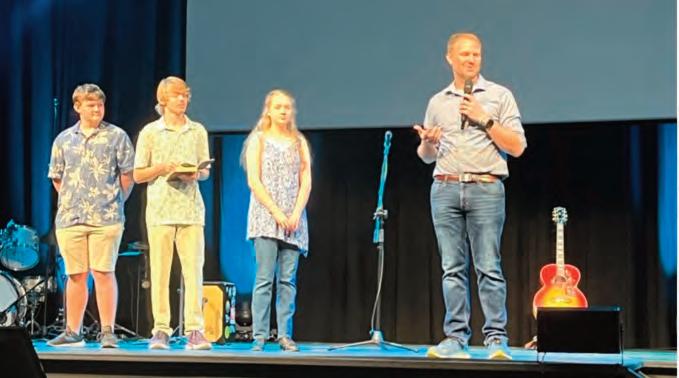

Edmond, Okla.
Established: 1965
Southern District Conference
Attendance: 160-180
Lead Pastor: Jeremy Jordan
A little over a year ago, we moved into a new worship space after renovating our gym into a new worship center. This has allowed us to continue to grow as we reach others with the truth of the gospel. However, as we grow, we must maintain unity and prioritize discipleship. Please pray we do this well in the season ahead. ★
Our congregation in three words: Welcoming Gospel Community
Connect with us! www.timbers.church www.facebook.com/www.timbers.church
How can you pray for us?
Top Photo: The team of Russell and Randi Laverty were among the teams that competed in a New Year’s Day cornhole tournament that also included a chili cookoff.
Middle: Students Michael Austin, Kaden Dockins and Bridgette Gilliland and youth director Derrick Austin share on a Sunday morning about their experience serving in March with SOAR Wichita.
Bottom: Prior to construction in 2022, the current worship center was the CTC gym.
Baptism/Memberships
Keith Warkentin, Paige Warkentin and Nora Limon were received as members May 4 at Corn (Okla.) MB Church.
Henley Eustice was baptized May 18 at Pine Acres Church, Weatherford, Okla.
Nathan Byford was baptized May 18 at Parkview MB Church, Hillsboro, Kan
Nick Kleinsasser, Anthony Williams and Nevaeh Garcia were baptized and received as members April 27 at Bethesda Church, Huron, S.D. Patricia Williams, Arnold Case and Jennifer Case were also received as members.
Melayne Casanova, Addilyn Gunden, Braylen Gunden and Molly Martin were baptized April 27 at Hesston (Kan.) MB Church
Aden Fredrick and Amber Fredrick were received as members April 27 at Ebenfeld MB Church, Hillsboro, Kan.
Seven people were baptized April 20 at Greenhouse Community Church, Saratoga Springs, Utah.
One person was baptized April 20 at Bethany Church, Fresno, Calif.
Six people were baptized April 20 at Axiom Church, Peoria, Ariz.
Kaleb T. and Niah C. were baptized and received as members April 20 at North Fresno (Calif.) Church.
Rose Drew, Dimitri Mack, Andrea B. and Zeke Moriss were baptized April 20 at Redemption Church, Owatonna, Minn.
Compiled by Janae Rempel Shafer
Kori Bacon, Roy Culver, Josie Laverty, Julie Laverty, Ava Martens, Brynlee Nightingale and Bryson Pembrook were baptized and received as members April 20 at Fairview (Okla.) MB Church. Wyatt Bacon was also received as a member.
Anul, Danielle Johnson and Ma’Ziiya Davis were baptized April 13 at Butler Church, Fresno, Calif.
Sophia Jones, Hayes Proctor, Layla Hopkins and Everly Hopkins were baptized May 11 at South Mountain Community Church, South Jordan (Utah) Campus. Heather Jeppson and James Jeppson were baptized April 13. Thomas Cale, Judy Chapman, Alyson Cooper, Brian Cooper, Carlos Cortelezzi, Alyssa Darkins, Emery Hann, Matthew Larson and Kenzie Wilde were baptized April 13 at St. George (Utah) Campus. Corbin Beck, Deven Ransom, Gary Simpson, Dani Siddoway, Amy Campbell, Hannah Gibbs, Jonathan Gibbs and Melanie Finlay were baptized April 13 at Draper (Utah) Campus.
Lisa Goodiron and Lydia Dowty were baptized April 6 at Renewal MB Church, Rapid City, S.D.
Eighteen people were baptized April 6 at Reedley (Calif.) MB Church. Six people were received as members.
Zeanna Stenzel and Violet Epp were baptized April 2 at Koerner Heights Church, Newton, Kan.
Stephen Anderson was baptized March 30 at Lakeview Church, Stansbury Park, Utah, Campus. Elizabeth Belnap, Jacquelyn Jorgensen, Michael Buss and Micah Hassett were baptized at Grantsville (Utah) Campus.
Heath Gray and Terri Walker were baptized March 30 at Pine Acres Church, Weatherford, Okla
Joe Skillen concluded his service May 31 as teaching and discipleship pastor at Ridgepoint Church, Wichita, Kan.
Sheila Penner concluded her service May 29 as hospitality coordinator at Reedley (Calif.) MB Church.
Holly Funk began serving as facility/event manager at Pine Acres Church, Weatherford, Okla.
Shaula Conrad concluded her service May 22 as administrator at Neighborhood Church, Fresno, Calif.
Dave Dreyfus concluded his service April 27 as associate pastor at Good News Fellowship, Ferndale, Wash.
Tiffany Miller concluded her service as daycare director at Hillsboro (Kan.) MB Church in May.
After 10 years of ministry, Branches Outreach Mission, Providence, KY, closed Dec. 30, 2024, following the retirement of pastor Robert Townsend.
Braun, William ‘Bill’ Ray, Reedley, Calif., member of Reedley MB Church, May 2, 1938— March 18, 2025. Parents: Abe and Louise Braun. Spouse: Carol Regier. Children: Sheryl Reimer, Randell; seven grandchildren, four great-grandchildren.
Dodson, Connie Lou, Weatherford, Okla., of Bible MB Church, Cordell, Okla., July 20, 1961—March 13, 2025. Parents: Loyd W. and Helen (Bartel) Miller. Spouse: Gary Dodson
(deceased). Children: Brooke Caswell (deceased); two grandchildren. Stepchild: Gerard Dodson.
Ediger, Ervin David, Hillsboro, Kan., member of Hillsboro MB Church, Nov. 4, 1935— April 15, 2025. Parents: J. Pete and Alice (Schuber) Ediger. Spouse: Carrol Franz. Children: Barbara Buller, Kay, David; seven grandchildren, 15 greatgrandchildren.
Enns, Patricia Louise, Reedley, Calif., member of Reedley MB Church, April 12, 1939— March 10, 2025. Parents: Eugene M. and Rhoda V. (Lankford) Askin. Spouse: Harold J. Enns (deceased). Children: Sandy Long, Judi Szpor, Sharol DeGroot; seven grandchildren, seven great-grandchildren.
Franz, Eleanor Wanda, Wichita, Kan., member of Ridgepoint Church, Wichita, Nov. 29, 1934—April 18, 2025. Parents: Frank and Tina Reimer. Spouse: Harold E. Franz (deceased). Children: Chris O’Bannon, Debbie Hardy, Susan Koslowsky; nine grandchildren, 20 great-grandchildren.
Hiebert, Viola, Hesston, Kan., founding member of Koerner Heights Church, Newton, Kan., Nov. 17, 1927—May 28, 2025. Parents: Henry and Ann (Klaassen) Jost. Spouse: Victor Hiebert (deceased). Children: Wayne, Jeanette Smith, Nadine; four grandchildren, nine greatgrandchildren.
Jonker, Richard C., Colwich, Kan., member of Ridgepoint Church, Wichita, Kan., March 30, 2025. Parents: August and Juanita Jonker. Spouse: Carole. Children: Kimberley West, Matthew (deceased); five grandchildren, six great-grandchildren.
Lowen, Betty Lou, Salem, Ore., member of Kingwood Bible Church, Salem, Aug. 20, 1927—April 20, 2025. Parents: Abraham and Nettie Loewen. Spouse: Marvin J. Lowen (deceased). Children: James, Mark; two grandchildren, two great-grandchildren.
Phillips, Nellie Ella, Salem, Ore., member of Kingwood Bible Church, Salem, July 24, 1935—March 11, 2025. Parents: Charles and Lila Barber. Spouse: George Noble, Harry Phillips Sr. (deceased). Children: Berlena Miller, Denise Slate, Sylvia Shell. Stepchildren: Teri, Connie, Junior, Alice; 20 grandchildren, 39 great-grandchildren, six great -great-grandchildren.
Troyer, Joel J., Wichita, Kan., member of Ridgepoint Church, Wichita, April 6, 1955—March 28, 2025. Parents: Duane and Jean Troyer. Spouse: Carol. Children: Travis, Jenny Simon, Mason, Reed, Preston; 11 grandchildren.
Wiens, Eldon Wayne, Hillsboro, Kan., member of Ebenfeld MB Church, Hillsboro, Sept. 21, 1933—May 8, 2025. Parents: J.B. and Agnes Wiens. Spouse: LaVonne Seibel. Children: James “Brad,” Diane Schmidt, Kim, Cheryl Kauffman; 12 grandchildren, six great-grandchildren.
Discipleship
Community Bible Church, Mountain Lake, Minn., held an eight-week “Practicing the Way” course on spiritual disciplines and the apprenticeship model of following Jesus.
Bethany Church, Fresno, Calif., held “A Better Us” course highlighting four keys to enhance marriage.
New Hopedale Mennonite Church, Meno, Okla., had a Good Friday walk-through event April 18.
Fellowship
Good News Fellowship, Ferndale, Wash., planned a family camp June 12-15. Men planned a cornhole tournament and BBQ June 7. The congregation had a campfire game night May 16.
Community Bible Church, Olathe, Kan., members of the fully alive group planned to gather for games and a meal June 7.
Axiom Church, Peoria, Ariz., planned a summer water bash with BBQ June 1.
North Oak Community Church, Hays, Kan., seniors had an afternoon at the movies May 24.
Bethany Church, Fresno, Calif., attended a Grizzlies baseball game May 24 and gathered for tea May 3.
Lake Region Mennonite Church, Detroit Lakes, Minn., families had a picnic and treasure hunt May 21.
Butler Church, Fresno, Calif., held its annual picnic May 18.
Pine Acres Church, Weatherford, Okla., women had a tea party May 18. The church held an end of school party with slip ‘n slides and snow cones May 7.
Shafter (Calif.) MB Church had a family day with a meal, Bingo and Bible trivia May 18. Women had a garden party May 4.
House of the Gospel, Fresno, Calif., women had a social May 10. The congregation held an Easter festival April 14 with an egg hunt, bounce
houses, games, haircuts and bike repairs.
New Hopedale Mennonite Church, Meno, Okla., women had a spring tea and blind date with a book May 10.
Mountain View Church, Fresno, Calif., attended a Fresno Grizzlies game May 24. Women had tea May 10.
Kingwood Bible Church, Salem, Ore., seniors went to Adelman Peony Gardens for an outing May 7. Women played games and made mini bouquets April 4.
Ridgepoint Church, Wichita, Kan., young adults enjoyed a Wind Surge baseball game May 30. PrimeTimers enjoyed lunch at an Amish farm May 7. Women went on a garage sale treasure hunt May 3 and held a salad lunch and cookie decorating April 13.
Copper Hills Church, Peoria, Ariz., mothers and daughters enjoyed a spring event May 3.
Axiom Church, Peoria, Ariz., women played bunco May 2.
Reedley (Calif.) MB Church women had tea May 3. Moms had a picnic May 1.
Hesston (Kan.) MB Church held a block party April 30.
Zoar MB Church, Inman, Kan., women enjoyed tea and treats April 26.
North Fresno (Calif.) Church women went on a retreat April 25-27. Men had a BBQ April 26. The congregation had a courtyard celebration with lawn games, a donut wall and a photo booth April 20.
Valleyview Bible Church, Cimarron, Kan., women had a night out April 25.
Zoar MB Church, Inman, Kan., hosted a family Easter event April 23 with a meal, games and egg hunt. Women held a cooking class April 19.
Cross Timbers Church, Edmond, Okla., held an egg hunt April 20.
Corn (Okla.) MB Church held a skeet shooting tournament April 6.
Ebenfeld MB Church, Hillsboro, Kan., had a chili cook-off April 5.
New Beginnings Fellowship, Ulysses, Kan., women held an event April 5.
Good News Fellowship, Ferndale, Wash., began offering a weekly open gym for parents and children. The church had a BBQ and egg hunt April 13 and a family game night April 4.
Cornerstone Community Church, Harvey, N.D., held a candy bar bingo event March 29.
Bible MB Church, Cordell, Okla., men had breakfast March 8.
Mountain View Church, Fresno, Calif., celebrated its 31st anniversary May 4.
Reedley (Calif.) MB Church celebrated 120 years in 2025.
Neighborhood Church, Fresno, Calif., prayed over classrooms and teachers at an elementary school May 29 and partnered with other churches and the Jackson neighborhood to host an Easter celebration April 12 with games, bounce houses, community resources, raffles, egg hunt and more.
Axiom Church, Peoria, Ariz., did a prayer walk May 3.
Community Bible Church, Mountain Lake, Minn., donated $7,000, which was split between a local food shelf and youth ministry.
Iglesia Manantial de Agua Viva, Omaha, Neb., sold pupusas April 12 to raise money for the community center being built by Strawberry Lake Mennonite Church in Ogema, Minn.
Corn (Okla.) MB Church made Easter goodie bags for nursing home employees.
Lincoln Glen Church, San Jose, Calif., held its annual community egg hunt April 19.
Mountain View Church, Fresno, Calif., hosted free events for kids during spring break, including a camp April 14 and a spring spectacular speedway with games and crafts April 15.
Living Hope Church, Henderson, Neb., took treats doorto-door as an outreach April 6 and 13.
SouthLife Church, Wichita, Kan., hosted a community pancake feed and egg hunt April 12.
Salem MB Church, Freeman, S.D., held an Easter spring fest April 12.
Editor: The U.S. Conference of Mennonite Brethren Churches is seeking the next editor of Christian Leader, the magazine of U.S. Mennonite Brethren. The Christian Leader editor directs the production of the magazine as well as the magazine’s social media platforms and website. This is a remote position, reporting to the USMB national director. For more information, visit www.usmb.org/jobs. To apply, send a resume and cover letter in PDF format to offices@usmb.org.
Discipleship Pastor: Bethesda Church, Huron, S.D. is seeking a full-time discipleship pastor, integral to leading our ministry programs, which are designed to grow believers into godly disciples for the glory of God. The discipleship pastor will focus on empowering leaders within our diverse range of ministries by providing essential resources, recruitment support, training and pastoral care. Our goal is to develop strong lead-
ers who can effectively guide and nurture the spiritual growth of our church community. The discipleship pastor will work closely with the senior pastor, serving as a key partner in creatively devising new strategies to cultivate healthier disciples. For more information visit the church website.
Lead Pastor: Ebenfeld MB Church, Hillsboro, Kan., is seeking a full-time teaching pastor who will be responsible for providing sound biblical teaching, leading and equipping the congregation in its mission to “Gather, Grow, Go,” with a relational and engaging spirit through personal connections with congregation. His role and responsibilities also include pastoral care of members and attenders and active involvement in the local community. Ebenfeld is committed to an Anabaptist-evangelical theology as articulated in the MB Confession of Faith. https://usmb.org/confessionof-faith-4/ For more information or to submit resume, email to ebenfeldsearch@gmail.com
Pine Acres Church, Weatherford, Okla., held an Easter “Eggstravaganza” April 13 with egg hunt, inflatables and a message.
Koerner Heights Church, Newton, Kan., hosted a Spring Flight May 1 and an Easter egg hunt with games at Sunset Elementary April 12.
Living Hope Church, Henderson, Neb., children released biodegradable balloons April 20 with Easter messages to spread the news that Christ is risen.
Ebenfeld MB Church, Hillsboro, Kan., purchased 83 chickens for Mennonite Central Committee.
Hillsboro (Kan.) MB Church donated $2,465.22 to the Kansas Mennonite Relief Sale through a loose change offering and matching funds.
Herold Mennonite Church, Cordell, Okla., packed health kits March 30.
Reedley (Calif.) MB Church women made dresses for girls in DRC and Ethiopia through Dress A Girl.
Go to www.christianleadermag.com to receive C-Link articles delivered to your inbox.












































